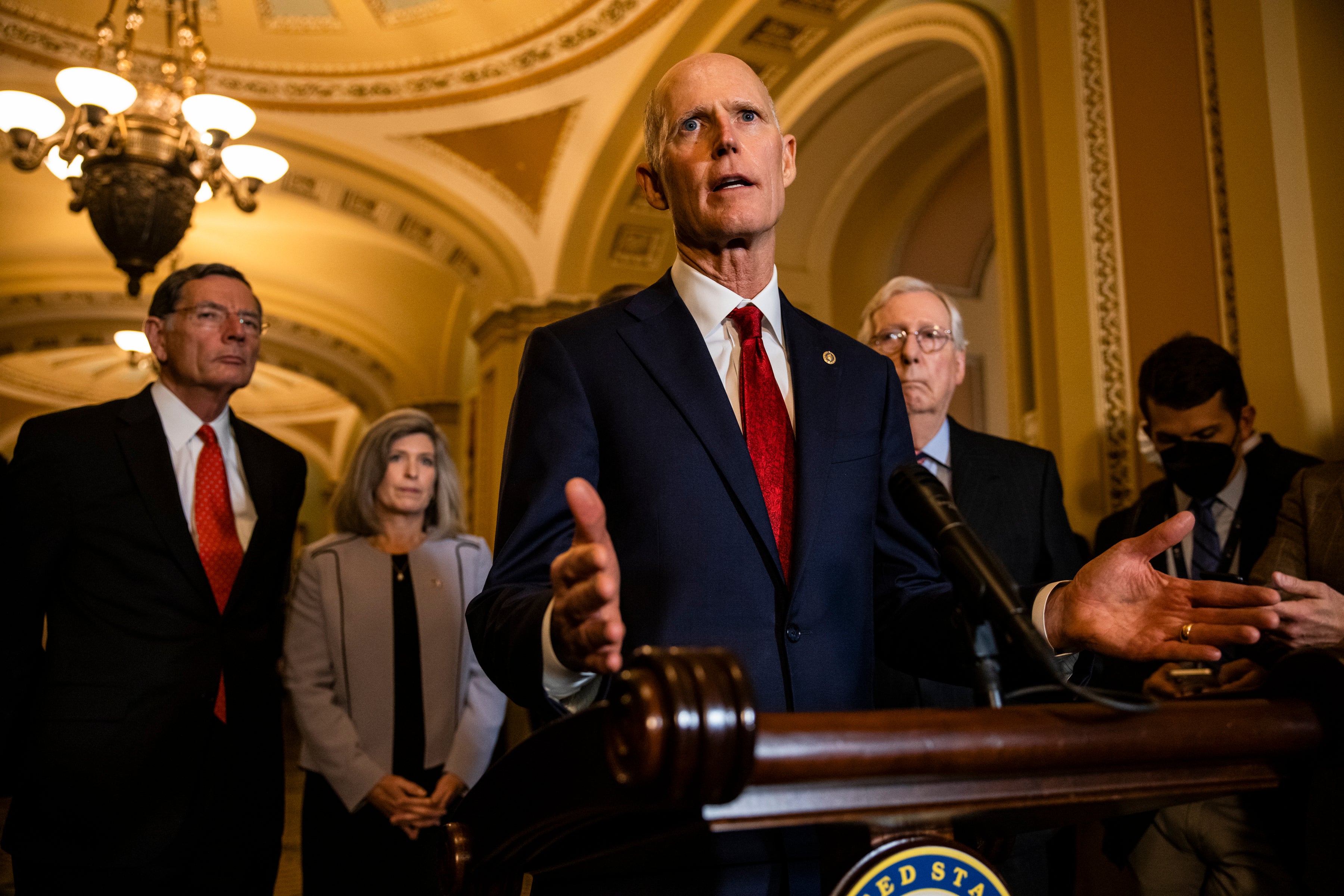Rick Scott is in charge of winning back the Senate for Republicans. Can he balance that and Trump?
The Florida Senator and chairman of the National Republican Senatorial Committee speaks with The Independent’s Eric Garcia about how he plans to win the Senate, why Hispanics will vote for Republicans and what role Trump will play in 2022


A wealthy Florida-based businessman with no electoral experience jumps into an open race and bulldozes his way to victory and then aggressively courts Latinos to improve Republican margins with them. That description may describe former president Donald Trump, but it’s also apt for the man in charge of Republicans winning back the Senate in 2022.
Since he jumped into politics in 2010, Sen Rick Scott has never lost a race, despite constantly running in nail-biter campaigns in the Sunshine State. That combination of a massive war chest – as a businessman, he’s poured his own money into his campaigns, and the Center for Responsive Politics reported in 2020 that he’s worth $260m –combined with his understanding of the Florida electorate (he speaks Spanish and his campaigns aggressively courts Latinos) is why his colleagues selected him to be chairman of the National Republican Senatorial Committee.
And he’s in a good spot to do so. President Joe Biden’s approval ratings continue to nosedive. Last month, a poll from Quinnipiac University showed that 46 per cent of Americans prefer Republicans to control the Senate, compared to 40 per cent of voters who want Democrats to control the majority. With a 50-50 Senate today, Republicans only need to flip one seat. But Mr Scott is planning to win much more than that.
“I think probably some of the places where we have to defend that if you just look at history, not this year’s numbers, but you’d say historically North Carolina, Pennsylvania, Wisconsin are more competitive states,” he told The Independent in an exclusive interview. Two of those states – North Carolina and Pennsylvania – have open seats after Sens Richard Burr and Pat Toomey, both Republicans, announced their retirement. And Wisconsin’s incumbent Republican Sen Ron Johnson has not yet announced whether he will seek reelection. All three Senators won their reelection in 2016 when Mr Trump shocked the political class by ascending to the United States’ highest elected office.
Mr Scott said he is optimistic that Democrats would nominate more far-left candidates in the primaries, which he argued would help Republicans.
“I think it bodes well for us to be able to defend all of our 20 seats and pick up multiple seats and pickup opportunities,” he said. At the same time, several candidates are vying for the GOP nominations in both Pennsylvania and North Carolina. Mr Trump endorsed Rep Ted Budd instead of former Gov Pat McCrory in the Tar Heel state, but Mr Budd has yet to catch up with Mr McCrory’s fundraising.
When it comes to the most vulnerable incumbent Democrats, Mr Scott cited Nevada’s Catherine Cortez Masto, Arizona’s Mark Kelly, Georgia’s Raphael Warnock and New Hampshire’s Maggie Hassan.
Three of those states have sizable Latino populations, with 9.9 per cent of Georgia’s population being Latino, 29 per cent in Nevada and 31.7 per cent in Arizona, with Georgia and Arizona voting Democratic for the first time in decades. But that came at the same time that Latinos across the nation moved rightward. Republicans also dominated with Latinos in Mr Scott’s home state of Florida, with Cuban-Americans and Venezuelan-Americans, whose experiences or those of their parents and grandparents escaping communist regimes make them fertile ground for Republicans, swinging hard right. Puerto Ricans living in the Sunshine State also contributed to the GOP’s strong showing.
During his time as governor, Mr Scott set up welcome centers for Puerto Ricans fleeing the island after Hurricane Maria, which likely helped his Senate campaign. Similarly, he launched an ad campaign during the 2018 World Cup in Spanish while his opponent, incumbent Democratic Sen Bill Nelson, had a lackluster Latino outreach, which likely cost him the race.
Mr Scott is hoping to repeat that same magic, already going after Mr Kelly, this week launching a Spanish-language ad targeting the incumbent who won a special election last year. Specifically, the ad hits Mr Kelly on education and immigration, which on the surface might seem peculiar given the history of Arizona Republicans’ support of immigration reform (such as the late John McCain, whose seat Mr Kelly holds). But Mr Scott is confident Republicans can win with the demographic on these topics.
“Well, first off, here’s the way I think about Hispanics. Hispanics are Republicans. If you look at our values, our values are the same,” he said, repeating Ronald Reagan’s aphorism that “Hispanics are conservative” but “They just don’t know it.”
“We only look at them as a separate group, but we use Spanish ads to be able to reach out to people,” he said, noting he has done this since his first race for governor in 2010. “ I think they’re going to be game changers. They were clearly game changers in my races. And I think in many states, they could possibly make the decision who wins.”
At the same time, Mr Scott has to grapple with Mr Trump’s influence in primaries. Case in point, Mr Trump has supported a primary challenger to Sen Lisa Murkowski in Alaska, who voted to impeach him for inciting the 6 January riot. But Mr Scott has said he will stick by her and other incumbents.
“Well, as I’ve explained to everybody, the bylaws of the Senate committee, it’s an incumbent committee run by the incumbent senators,” he said. “I’ve made the choice not to get involved in open primaries, but I’m going to follow the rules of the bylaws of the National Republican Senatorial Committee and support all incumbents.”
That refusal to get involved in primaries might also make things more complicated. Mr Trump can be both a blessing and a curse. Republican Gov-elect Glenn Youngkin largely won in Virginia by keeping Mr Trump at arm’s length and while the former president endorsed him, he didn’t rally with him. When asked what role Mr Trump would play, Mr Scott was evasive.

“Incumbents do a good job and they raise good money. So I’m optimistic that we won’t need to spend a lot of money to help our incumbents keep their seats,” he said.
At the same time, he said that Mr Youngkin’s victory in Virginia, which had voted overwhelmingly for Biden in 2020, gave a roadmap to winning back suburbs that had drifted away from Republicans during the Trump presidency, noting that the NRSC did a poll of the suburbs in the last week of September showing the GOP up by four points compared to being down by five points in August.
“I think that that suburban voters are going to continue to come back to us because of how bad the Biden agenda is. I can’t imagine he’s going to get any better,” Mr Scott said. Mr Scott also mentioned how Mr Youngkin and Virginia Republicans’ campaigning on opposing critical race theory, a niche legal theory that became a catch-all for plenty of types of education about racial bias and its history serves as a template in other states.
“And you saw in Virginia, clearly education is a big issue in the country where the party of parents, we always had them, but I think it makes it easy when these parents are now seeing exactly what their kids are being indoctrinated.”
Another potential challenge in the coming race is that even if Republicans dominate against Democrats, as expected, Mr Trump might also wind up saying elections were rigged. For his part, when asked whether the NRSC would challenge any election results, he responded in the affirmative, noting how the NRSC is part of litigation to defend Republican voting laws in Florida, Georgia, Texas and Iowa.
“And I think we’re figuring out if we can do something in North Carolina to defend their election laws,” Mr Scott said, alluding to his 2018 Senate campaign against Mr Nelson, which triggered a hand recount and lawsuits from both sides.
“And if we hadn’t, we’d had a very difficult time winning because I won by 54,000 or 57,000 votes election night, and then they illegally found ballot afterwards,” he said, in reference to ballots being found after the election.






Join our commenting forum
Join thought-provoking conversations, follow other Independent readers and see their replies
Comments